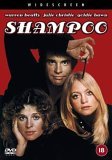 Shampoo | DVD | (08/12/2003)
from £14.51
| Saving you £-8.52 (N/A%)
| RRP
Shampoo | DVD | (08/12/2003)
from £14.51
| Saving you £-8.52 (N/A%)
| RRP A modish creation teased into life by Warren Beatty, Shampoo was an offbeat Hollywood hit back in 1975. Made after Watergate, it reflects on the hedonism of late-60s Los Angeles with a sad, somewhat cynical eye. Basically a bedroom farce, fuelled by some famously raunchy dialogue, its comedy is nevertheless underlain with melancholy. Screenwriter Robert Towne was inspired by Wycherly's Restoration comedy The Country Wife, wherein a wily fellow convinces friends of his impotence even while he is merrily seducing their wives. Hence, Towne invented handsome Beverly Hills hairdresser George Roundy (Beatty), who ought to be gay, but emphatically isn't. Shampoo begins on US Election Day, 1968, as Nixon is trouncing McGovern at the polls, and George Roundy is trying to sort his life out. An earnest advocate of sensual pleasure, he beds most of his female clients, from the fretful Jill (Goldie Hawn) to the wealthy Felicia (Lee Grant). Yet George is himself unfulfilled, and imagines that owning his own salon will satisfy him. He asks Felicia's husband Lester (Jack Warden) to back him, but first Lester coerces George into squiring his mistress Jackie (Julie Christie) to a Nixon victory party. Inevitably, Jackie is another of George's girls and, having seduced Felicia's vivacious daughter (Carrie Fisher) earlier that day, George has much to conceal from Lester and Felicia as the evening's festivities unravel. Shampoo shows the 60s turning sour. The characters are rich hippies, superficially liberated but deeply unhappy, and blandly indifferent to the dawning of the Nixon era. The excellent Lee Grant won an Oscar, but Shampoo is Beatty's film. He produced it, had a substantive hand in Towne's script, and deputised the nominal director, Hal Ashby. The film mildly exploits legends of Beatty's real-life sexual prowess, but mainly it embodies his commitment to making thoughtful movies for grown-ups. Richard Kelly
![Shampoo [1975]](/pictures/1014808.jpg) Shampoo | DVD | (13/01/2003)
from £N/A
| Saving you £N/A (N/A%)
| RRP
Shampoo | DVD | (13/01/2003)
from £N/A
| Saving you £N/A (N/A%)
| RRP Shampoo was billed as a sex comedy when it was first released in 1975, cashing in on the priapic reputation of its leading man and producer Warren Beatty. More than a quarter of a century on, that tag looks somewhat inadequate. Against a background of aimless bed-hopping and power-broking, Shampoo satirises the cultural and political wasteland of late-1960s Beverley Hills society. Ladies who lunch are married to ambitious, unfaithful husbands with mistresses; their daughters are dysfunctional; and the mistresses spend more time with their dogs than their lovers. George, the philandering hairdresser, is the common denominator who services them all. But he has private ambitions and is hustling for investment in his own salon. Beatty's restless performance as the man who can't say "no" is intriguing, waking up suddenly and too late to the chaos and vapidity of his life. The humour is bleak, sharpened by the background of Nixon's ascent to the White House: Shampoo is a cynical by-product of the Watergate scandal. There are good performances from Julie Christie and Goldie Hawn as two of George's leading conquests, and from a pre-Star Wars Carrie Fisher as the teenager who tries to seduce him. But Lee Grant garnered the awards as the embittered wife who finally calls "time". On the DVD: Shampoo is presented in 1:85.1 anamorphic widescreen, replicating the glossy production values of the original theatrical experience. The mono Dolby Digital 5.1 soundtrack is well balanced. There are no extras apart from standard subtitles. --Piers Ford

Please wait. Loading...
This site uses cookies.
More details in our privacy policy